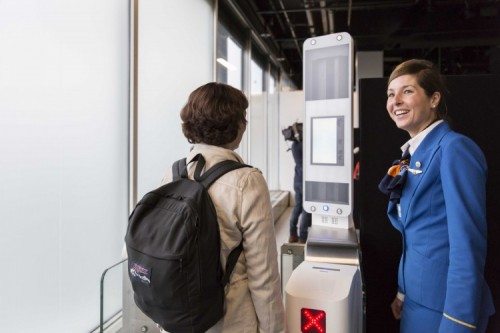JetBlue to Test Facial Recognition for Boarding Without Passports

Skift Take
In a first for a U.S. airline, JetBlue Airways in June will allow passengers to board some international flights in Boston by submitting to a facial scan at the gate, rendering passports and boarding passes unnecessary.
It's a small test, with JetBlue only planning to use the optional program on flights from Boston to Aruba. And it might not save passengers much time since they'll still need to show identification and boarding passes elsewhere, including in the airport lobby, and at security screening. But if it goes well during the 45 to 90 day test, JetBlue said it might look to expand the program.
Airlines outside the United States, including Air New Zealand, British Airways and KLM, have implemented biometrics-based boarding at some gates, and Delta recently said it would test using facial scans to authenticate some passengers in the Minneapolis airport lobby, including for baggage drop-offs. [Update: After this story was posted, Delta said it will soon test biometrics boarding in Washington, D.C.]
But no carrier in North America has tried using scans to facilitate boarding. JetBlue is calculating facial recognition will make boarding easier for passengers while freeing airline employees for tasks other than scanning boarding passes and checking documents. Eventually, JetBlue is hopeful it can use biometrics throughout the journey so travelers wouldn't need to show their boarding passes or documents anywhere.
"You could in theory literally walk through the entire process without taking out your boarding pass," said Joanna Geraghty, JetBlue's executive vice president for customer experience. "This is obviously just one small test as part of the overall travel experience. But we think there is a real potential here, long term, to create what everyone wants, which is seamless and easy air travel."
'Like a Selfie'
Starting June 12, JetBlue will rely on passenger data supplied by U.S. Customs and Border Protection for the test. At boarding, travelers who participate will have their picture taken, and the camera will transmit images to authorities. "It's like a selfie," Geraghty said.
Both U.S. citizens and non-citizens may participate, and the system will take five to seven seconds to process, said Sean Farrell, head of Portfolio management at SITA, the technology company that is helping organize the test. Then, it will return an answer — board, or do not board.
"It certainly will be as fast or even faster than the other methods available to board," Farrell said.
Since customers won't have boarding passes to display, Geraghty said some may forget where they're sitting, so JetBlue will have tablet-holding agents at the gate. Rather than repeatedly scanning boarding passes, they'll remind passengers where to go, and answer other questions about travel.
"We think the opportunity is freeing our crew members to do meaningful activities," Geraghty said.
Biometrics a priority for U.S. Customs
While the test is the first of its kind for U.S. airlines, it's not for U.S. Customs, which has for several years been trying strategies to track visitors using biometrics.
Last summer, it worked with Delta Air Lines to monitor customers on one daily flight from Atlanta to Tokyo. At the time, the government said it wanted to determine whether it could successfully compare an image of a customer taken at departure to a previous image of the same traveler.
This is part of a priority for customs to develop biometrics strategies so it can track visitors and know definitively when they leave the country. More than a decade ago, the 9/11 commission recommended the United States use biometrics to learn when visitors departed.
The government is finally taking more interest in tracking exits, Neville Pattinson, senior vice president of government sales for Gemalto, a company that creates biometrics solutions, said in a recent interview. And as the government invests in the technology required, he said, airlines may decide they want to use biometrics as well.
"This is the tipping point,'" he said. "[Airlines will say] 'OK, if the government is requiring it, how can we take advantage of it.'"




